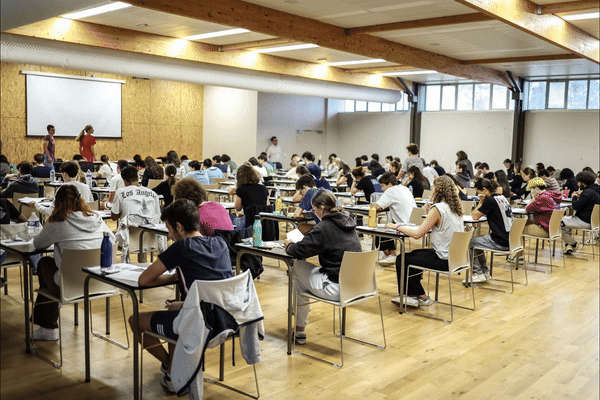
Teenagers are getting bogus ADHD diagnoses to score extra time in standardized testing exams — and numbers are surging after the tests were reintroduced by elite Ivy League colleges.
Parents are taking their children to doctors and psychologists for letters saying they have the condition or other mental disabilities, then getting as much as 50% more time to sit tests.
It can mean a 200-point boost to an SAT score, one expert said.
To get extra time, the SAT and ACT’s administrators require that students provide documentation of a disability from a mental health professional.
As well as ADHD, conditions such as anxiety and depression can qualify students for time accommodations.
Colleges are not informed that applicants were given extra time or accommodations and the overall number of students considered disabled is not released by test administrators.
But the Post spoke with students, parents, teachers, psychologists, and college admissions counselors who confirmed that the system is rife with abuse — which appears to have recently escalated in the wake of Yale and Dartmouth announcing they would start considering standardized test results again after ditching them during the pandemic.
“I get requests for ADHD testing accommodations all the time,” Dr. Camilo Ortiz, a clinical psychologist and professor of psychology at Long Island University, told The Post.
“Some parents are none too happy when I don’t agree the child has ADHD.”
One mom of a junior at an elite Manhattan prep school said that out of her daughter’s 8 closest friends, 6 have extra time.
“They’re getting really creative with it — it’s ADHD, or anxiety, or depression that leads to migraines that supposedly disrupts the testing,” she told The Post.
“It’s not hyperbolic to say that almost everyone is doing it.”
She added: “Admissions are so cutthroat right now, and she’s absolutely at a disadvantage without having extra time. But I’m self-made, and I’m not teaching my daughter to take any shortcuts in life.”
Christopher Rim, founder and CEO of college counseling firm Command Education, said that families are “1,000 percent” manipulating the accommodations for unfair advantages.
“There are definitely unethical families out there who are trying to take advantage of this system,” he told The Post.
“A student at a private school in Manhattan who all of a sudden gets an accommodation starting in 11th grade can look a little suspicious, because how do these kids get through school from kindergarten to 11th grade getting straight As, without needing any accommodations?”
Rim, who is unequivocally opposed to the practice, said he noticed an uptick in chatter about testing accommodations in recent weeks after Yale and Dartmouth announced they are reinstating testing requirements after abandoning them.
“It was a popular tactic before Covid, but it slowed down a bit when schools went test optional,” he said.
“In the past six months, I’ve had more and more students tell me their classmates all of a sudden got extra time.”
That time can be a massive boost to test scores.
“Most students don’t have the luxury of going back and checking their work, but if you have 50% more time, that’s a complete game changer,” Rim said. “If I were to guess, a score could possibly go up on the SAT by 200 points.”
Paul Rossi, a high school math teacher who taught at the $65,000-a-year Grace Church School in Manhattan for nine years, told The Post that he estimated a third of his students got extra time and said some of their disability claims seemed “bogus.”
“It’s quite a racket,” he said. “Educational psychologists rake in a pretty penny for diagnoses.”
One recent Ivy League graduate who went to Lawrenceville, an $80,000-a-year boarding school in New Jersey, estimated that as many as a quarter of her peers had extra test time.
“The system was exploited for sure,” the former student said. “More and more people got diagnosed as time went on, because I think they realized it was just something they could do because everyone else was doing it.”
While she said the extra time would have been a “massive” help to her standardized testing scores, she’s glad she didn’t game the system: “You don’t get that in real life. All of a sudden you graduate, and then what? No boss is giving you more time in a work day.”
The Learning Disabilities Association of America, in a statement, slammed people who abuse the system.
“These actions hurt all individuals with disabilities, including those with learning disabilities, by perpetuating the misconceptions that many students who obtain accommodations on college admissions do not have disabilities,” the association said.
The College Board, which administers the SAT said, “[Our] thoughtful and balanced process is designed to permit all students with disabilities who genuinely require accommodations a means to receive them while placing checks on those who may not require accommodations.”
The ACT said, “Documentation of the need for accommodations must meet guidelines that are considered appropriate by qualified professionals and must provide evidence that the student’s impairment substantially limits one or more major life activities that are relevant when taking the ACT test.”
Students with learning disabilities have been entitled to testing accommodations under the the Americans with Disabilities Act since 1990, and exceptions have long been abused.
William “Rick” Singer, the college admissions consultant behind the Varsity Blues scandal that ensnared celebrities like Lori Loughlin and Felicity Huffman advised his wealthy clients to lie that their children had learning disabilities to get notes from doctors for extra test time.
He even told one Manhattan client, white shoe law firm boss Gordon Caplan, to tell their child “to be stupid” during a psychological evaluation for extra time.
Caplan got a month in jail and was forced out of Willkie Farr & Gallagher, where he was co-chairman.














